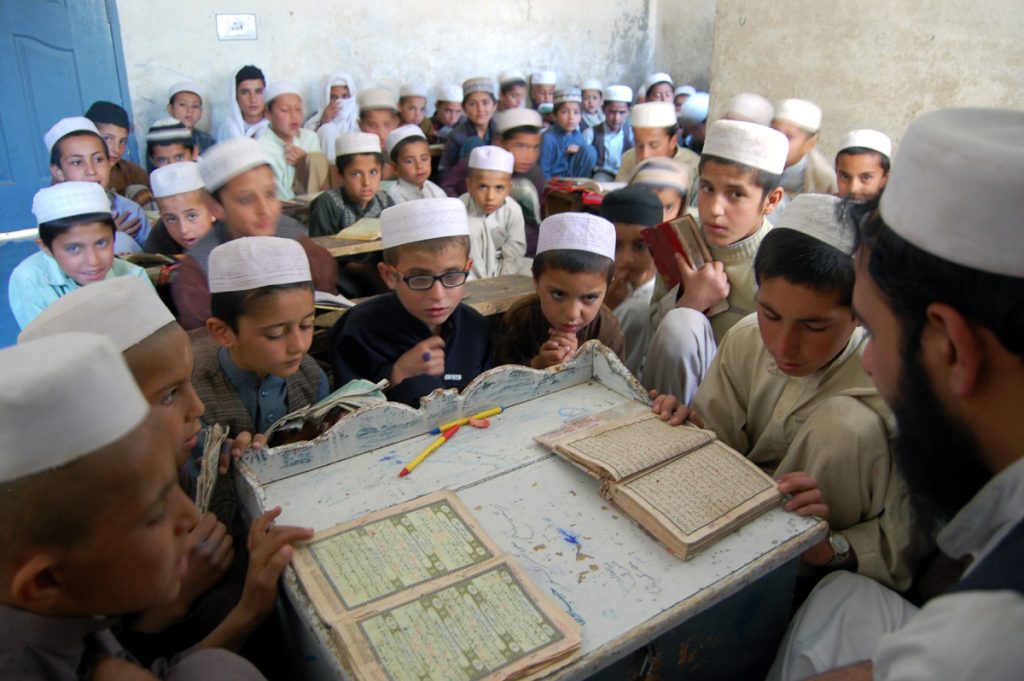Karachi: After recent reports that certain madrassas in Pakistan’s largest city may have connections with militant groups, the government efforts to reform them have gathered traction again. But it has left cold leaders associated with the religious seminaries who see such efforts as intrusion in their affairs.
“In recent months, various law enforcement agencies have distributed forms for collecting data about teachers, students and managements of the madrassas in the city,” said an annoyed Qari Muhammad Junaid, administrator at a religious seminary in Orangi Town in Karachi. “But forms are complicated and lengthy and seek needless details including information about their family”.
The discourse, and consequently the government efforts, to register madrassas or religious seminaries to streamline education and activities is a controversial subject, dividing the society along strong religious and liberal sentiment. In the past, madrassas have midwifed the birth of religious movements like the Taliban. They are seen as fostering and providing recruits for banned militant groups.
While in the past authorities have been slow to streamline the seminaries, the December 2014 attack on a school in Peshawar that left more than 150 people dead, most of them children, has spurred them into resolute action.
As part of the National Action Plan (NAP)adopted in early 2015 to fight terrorism, the government has directed law enforcement agencies to scrutinize the madrassas across the country, start registering them and assessing their sources of financial assistance.
“We have sealed a number of seminaries in the province after investigating their connections to banned militant groups and their sources of funding, especially from abroad,” said an official in Sindh Police Crime Branch, not named because he is not authorized to speak to media.
He said the law enforcing agencies had been examining the assets of seminaries, sources of financial assistance and expenditure, foreign students and teachers, especially those belonging to Afghanistan, affiliation of teachers and students with religious parties and jihadi groups and their activities.
“The Sindh government has also started geo-tagging of madrassas to mark their geographical locations,” the official told News Lens. “There are more than 10,000 madrassas in the Sindh province alone.”
In August this year, the home department in Sindh province told media – http://www.dawn.com/news/1202829 – that it has identified 49 madrassas with alleged connections to banned militant outfits. It asked the authorities to take action against them. 26 of these madrassas are in Karachi, 12 in Hyderabad, seven in Sukkar and four in the Larkana division.
But the religious parties and Ittehad-e- Tanzeemat-e-Madaris-e-Deenia (ITMD), a coalition of all five “wifaqs”(federations) of seminaries, has condemned the ongoing action against seminaries.
There are five boards (wifaqs) of madrassas of different schools of thoughts – Deobandi, Barelvi, Ahle-Hadith, Shia and Jamaat-e-Islami. The ITMD is coalition of all five wifaqs of madrassas. It was formed in 2004 in opposition to efforts of the military government of Pervez Musharraf to “regularize” madrassas to teach government-approved syllabus.
Interviews with madrassa representatives and officials of the ministry of religious affairs suggest that law enforcement agencies have sealed hundreds of seminaries across the country and arrested a number of students and teachers suspected of links with militant groups.
Mufti Muhammad Naeem, principal of Jamia Banoria International, one of the biggest madrassas in Karachi, said the government was not taking the madrassa boards into confidence before announcing their registration across the country.
“The government claims to be working on mainstreaming madrassas but the fact is bureaucrats have intentionally been foiling such efforts as they do not want to see madrassa graduates in top public positions, such as judges and commissioners,” said Naeem, who is also an executive committee member of Wifaqul Madaris Al-Arabia, a board of Deobandi madrassas.
However, to address the concerns of madrassa associations, the government has held a series of meeting to seek their support for revamping madrassas in the country.
On September 7, Prime Minister Nawaz Sharif met representatives from top religious seminaries to consult them on proposed reforms in curriculum, registration and the funding process of religious schools.
Sardar Muhammad Yousaf, federal minister for religious affairs, claimed that after several months of negotiations, government officials and leaders of the madrassahs have finally agreed on reforms, registration and assessing financial sources of seminaries.
He said registration of all madrassas in various phases has started throughout the country. “In a series of meeting with representatives of madrassa associations, we have addressed their reservations,” Yousaf told News Lens in a telephone interview. “Now they will assist the government in the registration process.”
However, security analysts and civil society activists are not satisfied with the government action saying it is under pressure from religious parties and madrassas associations not to carry out reforms.
Asad Iqbal Butt, an office-bearer of the Human Rights Commission of Pakistan, an independent rights body, said that it was the “prime responsibility” of the government to stop mushroom growth of seminaries in the province, especially in Karachi.
“The government is not able to face pressure from religious parties and the ITMD,” said butt. “It is the reason why bold measures have not been taken so far to bring seminaries under the government control.”




